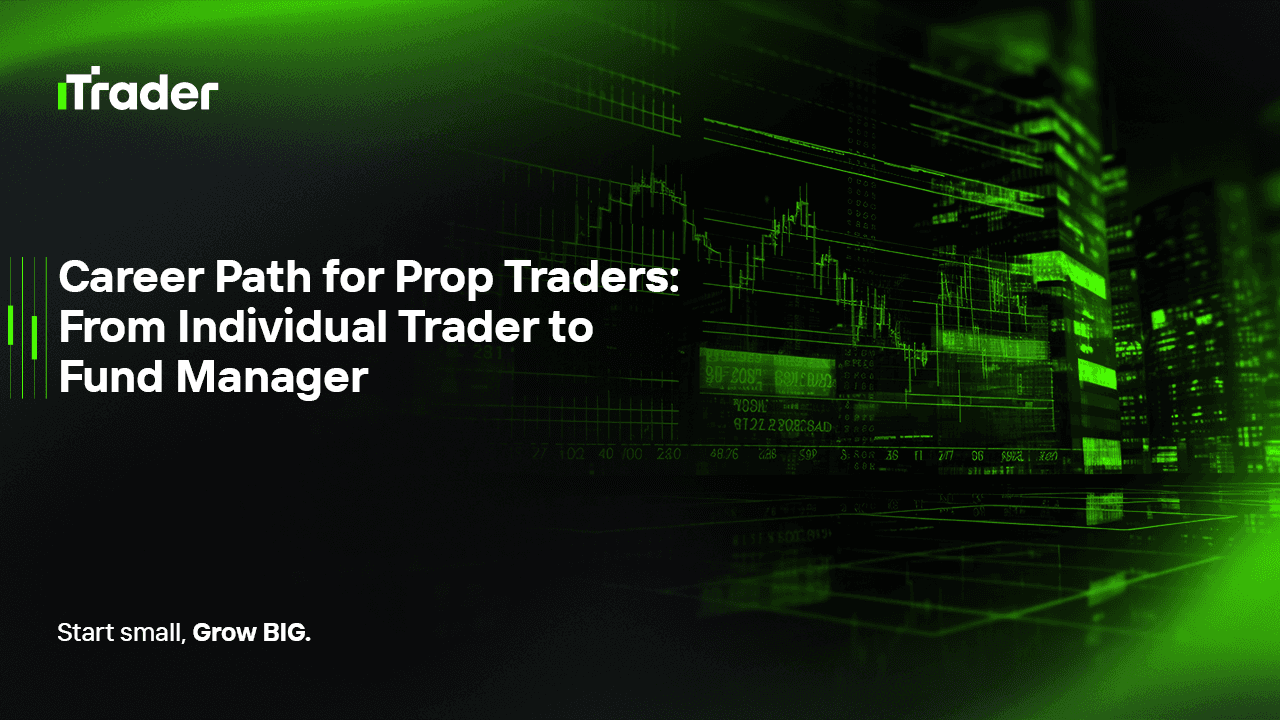2025-09-19
In the world of forex and financial markets, becoming a prop trader is a dream for many. Passing a prop firm’s evaluation and gaining access to capital without risking personal funds is a huge milestone. Yet, this is not the endpoint. On the contrary—it marks the beginning of a much broader career trajectory, where an independent trader can evolve into a portfolio manager and, ultimately, an asset manager.

This blog explores the career path of prop traders across five major stages, highlighting the goals, skills, and challenges at each level, as well as the future trends shaping this journey.
At this stage, discipline is everything. While strategy, indicators, and technical knowledge matter, they are never enough on their own. The real test lies in the psychological ability to accept losses.
Most traders fail prop evaluations due to over-leverage or impatience. This stage is essentially survival school—learning how to last long enough to build consistency.
Once an independent trader shows stable profitability, they often gain access to larger allocations within the prop firm. At this stage, the goal shifts from mere survival to institutional-grade performance.
Many traders at this stage sabotage themselves by trying to expand too quickly—juggling too many strategies at once and destabilizing their equity curve.
As advanced traders mature, they often begin collaborating with peers. At this stage, traders focus not only on their personal performance but also on contributing to a team or “strategy desk.”
Trust, transparency, and communication become central. A trader must respect not only their own discipline but also the team’s collective approach.
This stage represents a major career transition. Moving beyond prop firm capital, traders can attract external investors if they prove consistent performance.
The biggest obstacle is bridging the gap between personal trading style and institutional standards. For investors, profitability matters—but long-term stability and risk control matter even more.
The final stage is reaching the level of an asset manager. At this point, the trader is no longer just an operator but becomes a business owner managing capital at scale.
At this level, success requires a balance of technical expertise, business acumen, and interpersonal skills—a demanding combination that separates professionals from amateurs.
The career of a prop trader does not end with passing a firm’s evaluation. It is the beginning of a multi-stage progression:
At every stage, the keys remain the same: discipline, transparency, and reputation. With these, any trader can evolve from trading a small account to managing millions in investor capital.
© 2025 iTrader Global Limited|公司註冊編號:15962
iTrader Global Limited 註冊於科摩羅聯盟昂儒昂自治島穆扎穆杜 Hamchako,並受科摩羅證券委員會授權與監管。我們的牌照編號為 L15962/ITGL。
iTrader Global Limited 以「iTrader」為商業名稱經營,獲得從事外匯交易活動之授權。公司標誌、商標與網站均為 iTrader Global Limited 之專有財產。
iTrader Global Limited 的其他子公司包括:iTrader Global Pty Ltd,澳洲公司註冊編號(ACN):686 857 198。該公司是 Opheleo Holdings Pty Ltd 的授權代表(澳洲金融服務代表編號:001315037),Opheleo 持有澳洲金融服務執照(AFSL 編號:000224485),註冊地址為:Level 1, 256 Rundle St, Adelaide, SA 5000。
免責聲明:本實體並非本網站所交易金融產品之發行者,亦不對其負責。
風險提示: 差價合約(CFD)交易因槓桿效應具高度資本迅速損失風險,未必適合所有使用者。
參與基金、差價合約及其他高槓桿商品交易,需具備專業知識。
研究顯示,84.01% 的槓桿交易者最終蒙受損失。請務必充分了解相關風險,並在投入資金前確保自身已準備好承擔全部損失的可能性。
iTrader 特此聲明,對任何個人或法人因槓桿交易所導致之風險、損失或其他損害,概不承擔全部責任。
使用限制: iTrader 並不向法律、法規或政策禁止此類活動的國家或地區居民提供網站或服務。如您居住於限制使用本網站或服務之司法管轄區,您有責任自行確保遵守當地法律。